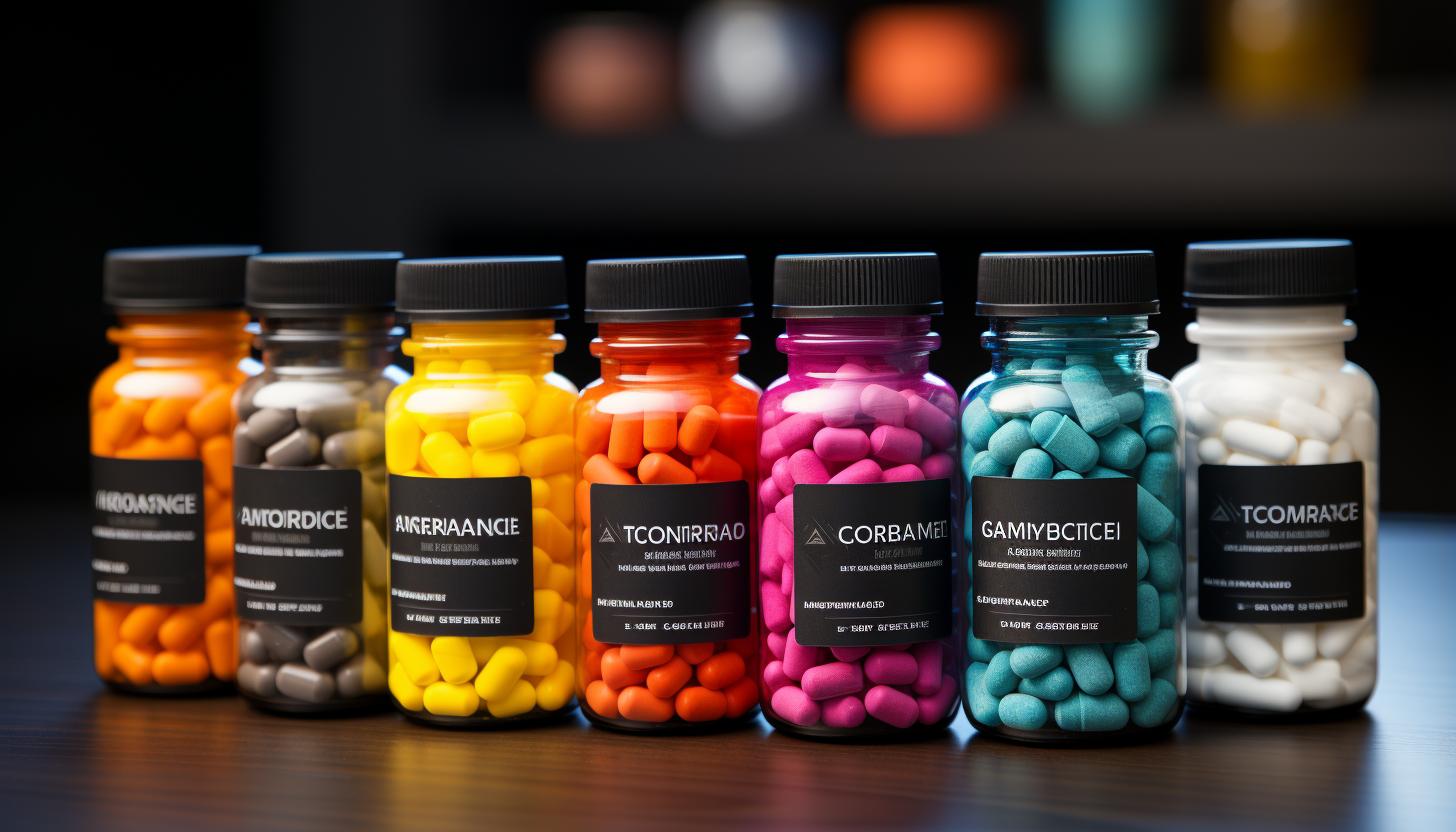Supplements for Endurance Runners: What Works and What to Avoid

Are you an endurance runner looking to boost your performance? Well, here’s a statistic that might catch your attention: over 70% of endurance runners use supplements to enhance their training.
But with so many options out there, it can be overwhelming to know what works and what to avoid. In this article, we’ll explore scientifically proven supplements, commonly used ones, potential dangers and side effects, natural alternatives, and how to choose the right supplements for your training.
Let’s dive in!
Scientifically Proven Supplements for Endurance Runners

There’s plenty of scientific evidence that supports the effectiveness of certain supplements for endurance runners. When it comes to optimizing your nutrition as a runner, research-backed supplements can play a crucial role in enhancing performance and aiding recovery.
One such supplement is creatine monohydrate. Creatine has been shown to improve strength and power output, allowing you to maintain a faster pace during long-distance runs.
Another beneficial supplement for endurance runners is beta-alanine. This amino acid helps increase muscle carnosine levels, which can delay fatigue and improve exercise capacity.
Additionally, omega-3 fatty acids have been found to reduce exercise-induced inflammation and support cardiovascular health.
Other important supplements for runners include branched-chain amino acids (BCAAs) and caffeine. BCAAs help preserve muscle mass during intense training periods while caffeine has been shown to enhance endurance performance by increasing alertness and reducing perceived effort.
It’s important to note that while these supplements have scientific evidence supporting their efficacy, they should not replace a well-balanced diet filled with whole foods. Supplements should be used alongside optimal nutrition for runners, including adequate carbohydrate intake for energy and protein consumption for muscle repair.
Always consult with a healthcare professional or registered dietitian before starting any new supplementation regimen to ensure it aligns with your specific needs and goals as an endurance runner.
Commonly Used Supplements to Boost Performance

To enhance your performance, you’ll want to know which supplements are commonly used and effective for boosting endurance. When it comes to endurance running, two popular options are energy gels and hydration drinks. Energy gels provide a quick source of carbohydrates that can be easily consumed during a run, giving you an immediate burst of energy. These gels typically contain around 100 calories and are designed to be taken every 45 minutes to maintain optimal fuel levels during long runs or races.
On the other hand, hydration drinks help replenish electrolytes lost through sweat and keep you hydrated throughout your run. They often contain a combination of carbohydrates and electrolytes such as sodium and potassium. This helps prevent muscle cramps and maintains fluid balance in your body.
Here is a table summarizing the benefits of energy gels and hydration drinks:
| Energy Gels | Hydration Drinks | |
|---|---|---|
| Benefits | Quick source of carbs for immediate energy | Replenish electrolytes & maintain hydration |
| Usage | Every 45 minutes during long runs or races | Throughout the run to stay hydrated |
Potential Dangers and Side Effects of Endurance Supplements

Hydration drinks, although beneficial for replenishing electrolytes and maintaining hydration during a run, can have potential dangers and side effects if not consumed in moderation. While these drinks are designed to help athletes stay hydrated and perform at their best, excessive consumption or reliance on them can lead to negative consequences.
One of the potential risks associated with overconsumption of hydration drinks is an imbalance in electrolyte levels. These drinks contain high levels of sodium and potassium, which are essential for proper muscle function. However, consuming too much of these electrolytes can disrupt the delicate balance within your body and lead to complications such as muscle cramps, nausea, and even cardiac issues.
Additionally, relying solely on hydration drinks for fluid intake during exercise may result in inadequate water consumption. This can lead to dehydration as well as impair your body’s ability to regulate temperature effectively.
Long-term effects of excessive hydration drink consumption are still being studied; however, some concerns have been raised regarding the impact on kidney function. The high sugar content in certain sports drinks has also been linked to weight gain and an increased risk of developing conditions like diabetes.
To avoid these potential risks and long-term effects, it is important to consume hydration drinks in moderation and alongside a balanced diet that includes plenty of water-rich foods. It is also advisable to consult with a healthcare professional or sports nutritionist for personalized guidance on supplementation during endurance training.
Natural Alternatives to Synthetic Supplements for Runners

While hydration drinks can be beneficial for replenishing electrolytes, runners may also consider natural alternatives that provide similar benefits without the potential risks associated with synthetic supplements.
Here are three herbal remedies and dietary alternatives to explore:
1. Beetroot juice: Research suggests that beetroot juice can enhance endurance performance by increasing nitric oxide levels in the body, which improves blood flow and oxygen delivery to the muscles. Its high nitrate content may also help reduce fatigue during prolonged exercise.
2. Tart cherry juice: Known for its anti-inflammatory properties, tart cherry juice has been shown to aid in muscle recovery and reduce exercise-induced muscle damage. It contains antioxidants called anthocyanins, which help fight oxidative stress and inflammation caused by intense exercising.
3. Coconut water: Not only is coconut water a refreshing drink to stay hydrated, but it also contains essential electrolytes like potassium and magnesium. These minerals are crucial for maintaining proper muscle function and preventing cramps during long-distance runs.
While these natural alternatives may not provide instant energy boosts like some synthetic supplements do, they offer a safer option for runners looking to optimize their performance without compromising their health.
As always, consult with a healthcare professional or sports nutritionist before incorporating any new dietary changes or herbal remedies into your routine.
How to Choose the Right Supplements for Your Training

When selecting the right supplements for your training, it’s important to consider factors such as your specific fitness goals, dietary restrictions, and any pre-existing medical conditions. There are many supplement brands to consider, each with their own unique offerings. To make an informed decision, it’s essential to understand the proper dosage and timing for supplements.
One brand that is well-regarded in the fitness community is Optimum Nutrition. They offer a range of supplements designed to support various training needs, including protein powders and amino acids. Another reputable brand is MusclePharm, known for their high-quality pre-workout formulas and recovery products.
To determine the proper dosage for a supplement, it’s best to follow the instructions provided by the manufacturer or consult with a healthcare professional. Timing is also crucial – some supplements are most effective when taken before or after workouts, while others may be best taken throughout the day.
Remember that supplements should never replace a balanced diet and healthy lifestyle. They are intended to enhance your training efforts, not serve as a substitute for hard work and dedication. By carefully considering your individual needs and consulting with experts when necessary, you can choose the right supplements to support your training goals effectively.
Conclusion
In conclusion, when it comes to supplements for endurance runners, it’s important to choose wisely. Scientifically proven options such as creatine and beta-alanine can enhance performance and delay fatigue. However, be cautious of commonly used supplements that lack solid evidence.
Moreover, always be aware of potential dangers and side effects associated with synthetic supplements. Consider natural alternatives like beetroot juice or tart cherry juice for their potential benefits.
Remember, finding the right supplements for your training requires careful consideration and consultation with a healthcare professional. Stay informed and make informed choices for optimal results.






